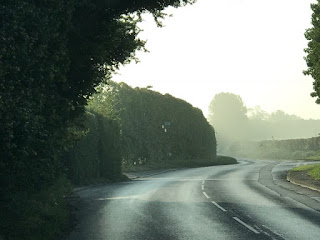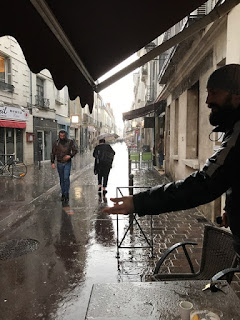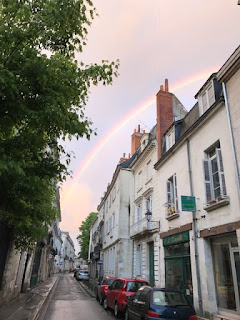It's been pretty amazing travelling
through France in May. We had a fair distance to travel, in less than
a week, from Calais down to the Dordogne, then on to the
Tarn-et-Garonne, and back again. We chose to use the péages quite a
lot, stacking up about £100 of tolls, but enjoying these magnificent
smooth roads almost empty for the most part, and able to cover great
distances without worry.
On the way south, I was struggling to
make sense of the various satnav information available to us on one
ancient dedicated machine and one modern phone, trying to avoid data
costs – by June, the use of data will be normalised (at least until
Brexit bites, I suppose), but the Navmii app is a pre-loaded map
which is supposed to give you up to date routing information. But it
just creates anxiety. In fact, using a good old road map, and the
brilliant French road signs, you can make faster decisions and get across
country more efficiently. The satnav tripped us up more than once,
leading to interesting but time-wasting diversions in forests,
suburbs, and new industrial estates. Sigh.
Some highlights. I have already described our visit to Tours which remains a shining light in my mind - a wonderful city with all-round great qualities. It loves itself and it loves its visitors.
Setting off to the Dordogne was ok,
though bugged by the silly belief that satnav would help. But we
reached our campsite – the Municipal Camping at Tocane St Apre, by
the R Dronne, in good enough time to set up the tent in daylight. We almost
had the place to ourselves. Our pitch was right beside the river,
with the roaring of a weir nearby. Songbirds were carolling
everywhere, and something croaking – maybe bullfrogs. We walked
a short mile or so to the nearby supermarket to get supplies – a
stroll through glorious meadows with all the local horses and ponies
enjoying the pasture and friendly enough to accept a tuft of grass if
offered over the electric fences. As we sat with our simple evening
meal, we noticed that there was a family of otters playing under the
bank across the river... they swam, scrambled up onto the grass,
hopped about, for about an hour. Behind them, the golden cattle
wandered in the huge meadow with its beautiful trees, and a
kingfisher darted about. It was magic.
That night, our airbed gave up the
ghost so first thing in the morning we drove round to the supermarket
to get a new one. Phew. Then off to explore the Dronne valley –
Perigueux, St Jean de Cole where there was an amazing Floriale – a
flower festival arranged in such a way that you had to pay to get
into the village. There were 10,000,000 geranium and tomato plants, fantastic flower stalls, cactus displays, temporary gardens laid out, automatic lawnmower displays, dreadful art and flower arrangements in the
church and the chateau, two lady gendarmes on horseback to keep the
peace, and a great time being had by all. The gendarmes - with their hats and pistols made it seem like a mad version of the Wild West.
The skies were constantly seething and rearranging themselves, with various distinct layers of white or eventually black masses of cloud. As the heat generated new cumulonimbus towers, the base of these became fantastically threatening and dark and then we had torrential rain - sometimes over just a small area - one village, say - or over a wider mistier district. The effect was mesmerising, and caused a certain amount of anxiety because the tent was new and we didn't know how waterproof it would be. In the end, it proved to be more or less ok.
The whole point of our trip was a 70th
birthday party – Mike knew there was going to be a gathering but
had no idea who was coming. He actually cried at one point as he realised that a couple of dozen people had travelled in secret from the UK
to be there.... It was a lovely party, and we met up with various
long-lost old friends. The party was in a marquee in his
courtyard, lavishly lit with sparkly lights and the entertainment
provided by a truly excellent singing trio called Candy Stripe –
three English women who sing close harmony and who have a really
impressive repertoire. Bravo!
Back to the tent to crash out on the new airbed.
It lasted 3 hours. We discovered that it is possible to sleep on the
cold hard ground..... (Sob).
On Sunday, we had to strike camp –
luckily it wasn't too wet, and we took the split airbed back to
Intermarche, and got our money back. One seam had just failed to seal. Then we headed for the
Tarn-et-Garonne.... and my sister's house. Once again the satnav led
us a merry dance but overall our journey was through blissfully
beautiful landscapes, forests, rolling roads, tiny hamlets, with
rivers all names and roadworks being briskly managed. How organised! It makes you wonder, at what point in time did someone decide which bits of forest to clear.... One thousand, two thousand, ten thousand years ago? Modern French forestry techniques look pretty brutal, and we didn't see any bluebells at all, although there's some coppicing among the pine groves and the older oak forests with their larger trees.
It's odd staying with relations – so
much is just normal, but so much is at a distance – the ways in
which we differ, the old rivalries put aside in the interests of
adult enjoyments and new insights. My sister and her husband are
working on their old farmhouse and making it absolutely beautiful –
the plasterwork, the wiring, the décor. We'd visit more often but it's such a long way
away from home.
Chris made us a lovely meal - a deconstructed prawn cocktail, he called it, and then a roasted chicken and ratatouille thing. Nom nom. We didn't
stay up very late due to two nights of not much sleep.... I hope we
were forgiven.
In the morning we set off again
to the north and bashed up the main road to Limoges and eventually
Blois where we stayed last night. Oh, how our thoughts stray back
to our evening in Tours – not that far away in kilometres, but a
world away in experience. This city – with its 'most royal' of
chateaux – is more beaten-up than Tours, rougher, duller. The
tourists have less choice. The push to spend spend spend is not
concealed. Whereas in Tours our car was safely stowed in a carpark,
and we found music shops and saw students from the conservatoire
carrying their instruments, and heard them practicing, and the
cathedral gave us shelter from the storm, here in Blois it's less
accommodating. The carpark is behind a barred and circuitous route,
and the entry to too low for the height of our car. The menus are all
plasticised. The bank machine had run out of money. The pavements
around the chateau dwindle to nothing so you have to walk in the road.
Somehow, it's less friendly (though the pretty young lady verger at
St Vincent's did let us in to have a quick look inside). The meal last night was pimped up as artisanal, but was (I think) mostly
a theatrical sleight of hand....
The most interesting thing is that the sitting right on the R Loire, the city has two completely different
characters, which make me think of how London must have been from
Roman times right up to the age of concrete. One bank has its huge
chateau-fort, churches, money, squares, buildings, history, height,
royalty, tourism, complexity, and money. The other bank, on the
south, has a single row of low houses – maybe two storeys high at
the most, strung out like the fishermen's cottages at Deal beach.
Presumably no rock for foundations, just mud, and so no tall
buildings, nothing to defend, just a muddy swampy village, sitting
facing the glamour and power of the other bank. In London the city was on the north bank, and a small huddle of brothels and dives existed on the southern end of London Bridge - until they learned how to create artificial foundations in the 17th and of course later the 19th century. Christopher Wren lived in some of the old brothel buildings when he was building St Pauls - he could look across the water and see his creation rise over the skyline. Apart from the fact that the water here flows to the west, and in London of course it's to the east, you could see this same scenario at Blois.
Just as we sat and watched the otters
on the Dronne, the peasants on the south bank at Blois must have
watched the gambolling of kings and gentry on the north bank. Somehow
I don't suppose the aristos paid the slightest attention to the
farmers and lackeys on the other side. Of all the riparian watchers
mentioned in this blog, I think we were the most fortunate. The
otters were wondrous.



















